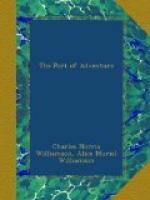If not—“May God help me!” she heard herself saying. For an instant she stared at the oncoming black wave which swept on, faster and faster toward her, so incredibly, terribly fast now that in another second she knew they would break down the line of wire fence. The cattle, those that were not trampled to death, would soon pour through the gap, would sweep on and on, overwhelming this hill where she stood.
Strange, some lines of a poem were saying themselves in Angela’s head. She had read them lately, since she came to America, the story of a stampede and a girl. Laska—yes, that was the name—loved a man, and saved him from the rush of wild cattle by covering his body with hers, protecting it with her bleeding flesh from the blows of the iron hoofs.
Nick had given her the book. She had been in a train when she read the story of Laska. She saw herself sitting safely and cosily in a stateroom, all panelled satinwood and green velvet. Now——
Blindly she started to run. It was useless, she knew, for the fence was certain to go, and she could no more outrun that black billow of death than she could outrace one of Paolo di Sereno’s aeroplanes. Yet instinct made her run toward the far-off road, away from the plunging, bellowing cattle. She thought of Hilliard, and how he would hate to hear of the death she had died. He would give his life for hers, as Laska had given her life for her lover.
XXIX
THE PARTING OF THE WAYS
Just as Nick was finishing a somewhat hurried and sketchy luncheon a telegram was handed to him. It was from Max Wisler, the San Francisco detective, and it said laconically, “Don’t let A. M. visit C. G.”
As Nick read, the blood rushed to his forehead, and he sprang to his feet, knocking over the chair in which he had been sitting.
Max Wisler had not been told by him that Mrs. May was to visit Mrs. Gaylor; but that must be what he meant. It had not occurred to Nick that it could be necessary to mention Angela’s brief stay, in telling Wisler that he himself was “running up to Lucky Star.” The detective must have found out in some ferreting way of his own. And he had telegraphed, “Don’t let A. M. visit C. G.” What could be his reason? Then suddenly a dreadful explanation flashed into Nick’s head; flashed there and stayed, as if printed in letters of blood on his brain.
Wisler had been right after all. He had found out who sent the box of poison oak. Those hateful questions of his, so much resented, had been justified. There could be no other explanation. Nothing else could excuse this warning. It seemed too hideous to be true that Wisler had telegraphed because there was danger for Angela, and yet——




